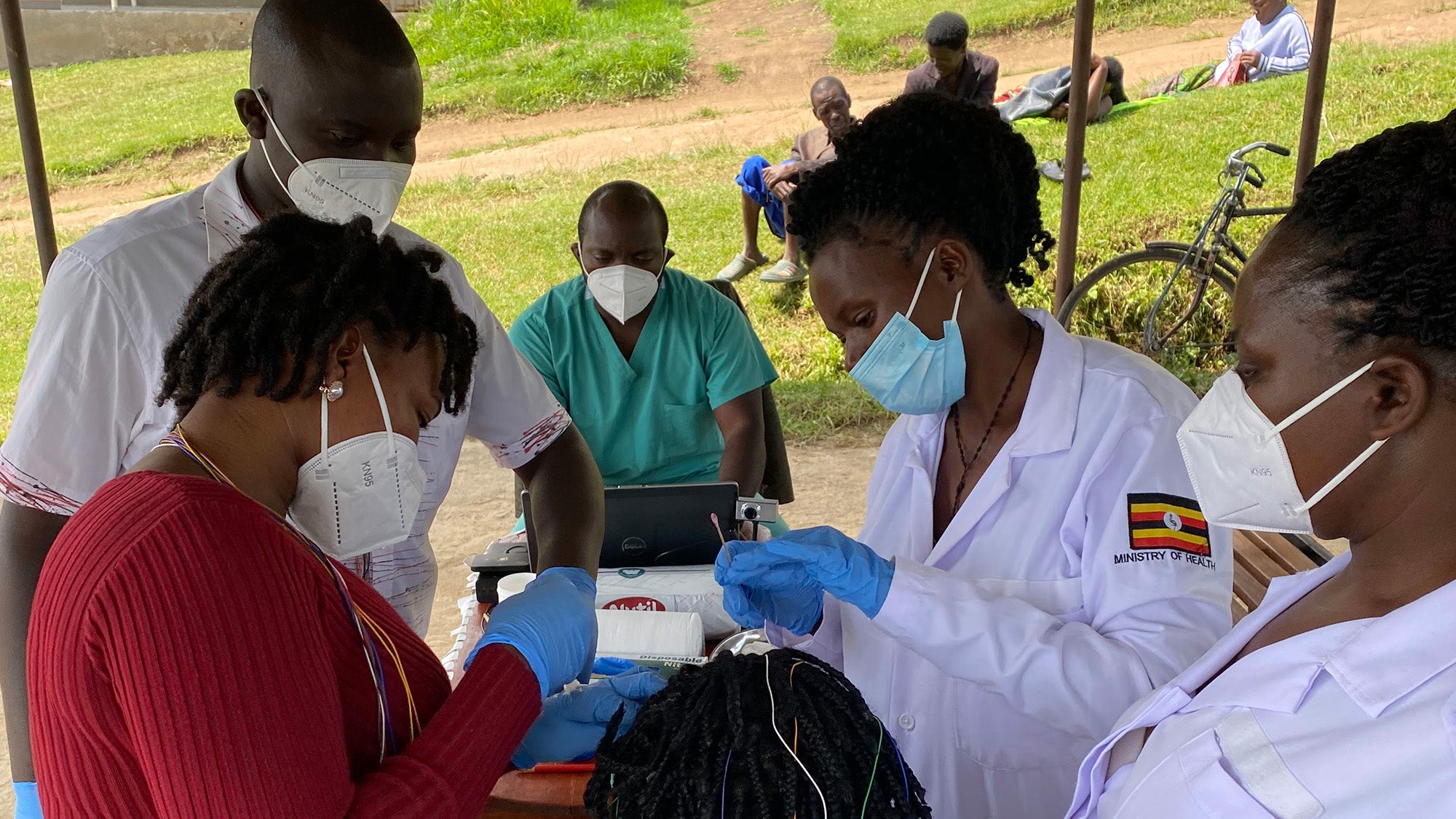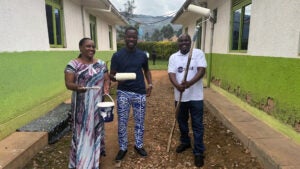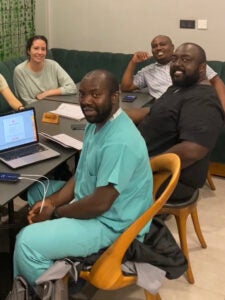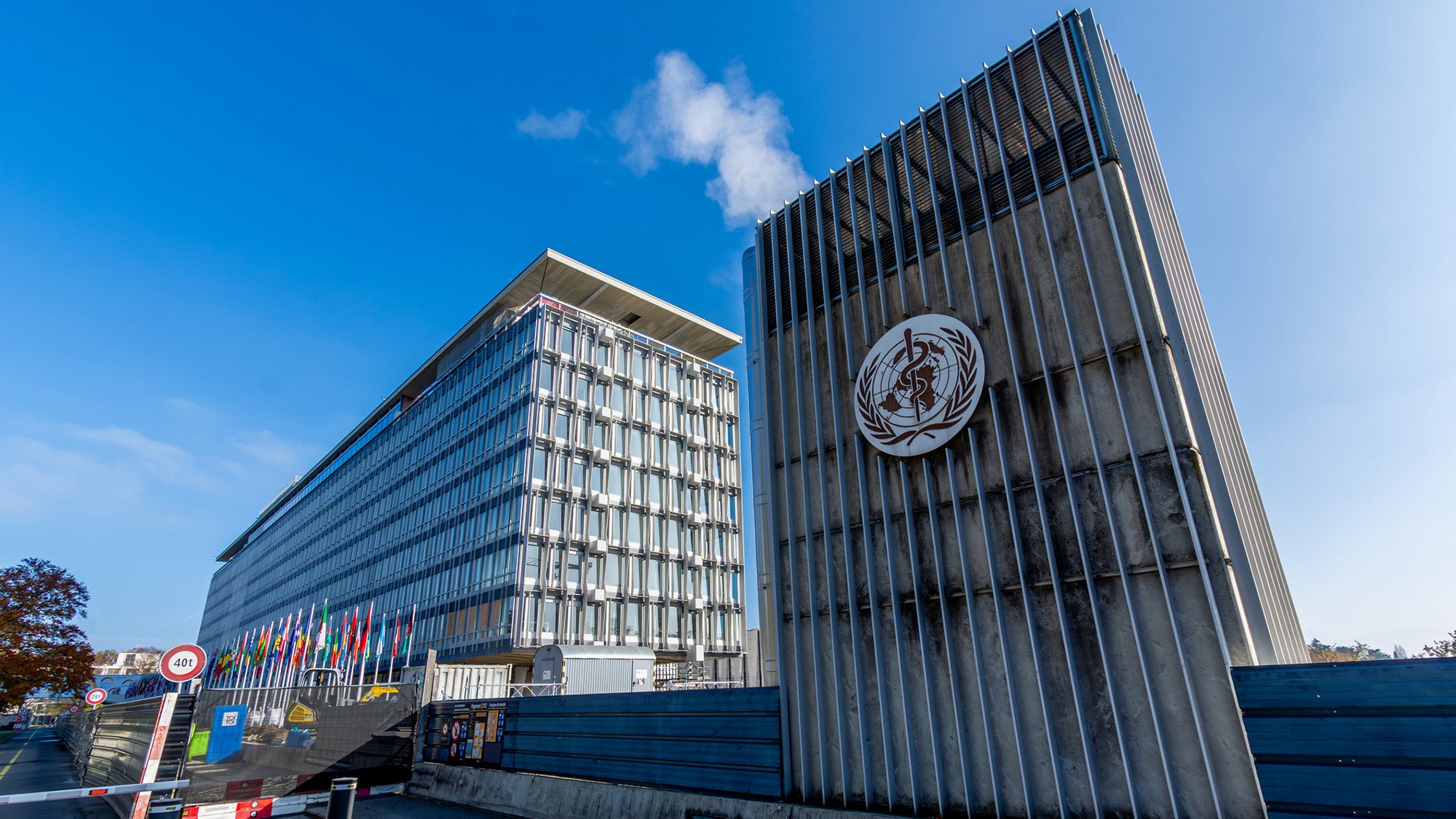Students help bolster mental health, epilepsy care at Ugandan clinic

Teguo Djoyum, DrPH ’25, Erin McGuinness, DrPH ’25, and Olabiyi Olaniran, MPH ’25, will receive the Gareth M. Green Award for Excellence in Public Health Practice for their work with the JCK Clinic in Uganda.
Olabiyi Olaniran, MPH ’25, a medical doctor from Nigeria, recently spent an intensive week working at the John C. Kelly (JCK) Clinic in rural Kabale, Uganda. His primary task was to evaluate the integration of electroencephalogram (EEG) technology into the clinic’s epilepsy care program, but as he wrote in a blog post, he wound up contributing in multiple other ways, including bringing hot tea to patients in the waiting room, painting the clinic, and helping establish a support group for epilepsy patients that is generating income for its members through livestock farming.

Olaniran is the sixth student from Harvard T.H. Chan School of Public Health to conduct a practicum project at JCK over the past three years. He and the two other current students who worked at the medical and mental health clinic—Teguo Djoyum, DrPH ’25, and Erin McGuinness, DrPH ’25—will receive the Gareth M. Green Award for Excellence in Public Health Practice at the School’s annual awards ceremony on May 27.
Fellowships provide opportunities
McGuinness and Yacine Fall, SM ’23, were the first Harvard Chan School students to go to JCK, working during the summer of 2022 on an assessment of the clinic’s mental health services and needs. They were funded through a fellowship established by Stephen Kelly, father of JCK’s namesake, to support work at the clinic.
JCK CEO Centinary Gervase had focused on addressing mental health stigma since the clinic’s launch in 2011 and had earned the trust of the community, McGuinness said. Gervase was interested in figuring out the best next steps for the mental health program, and asked the two students to conduct interviews with community members and develop recommendations.

“It was really nice to be able to learn and work with a real leader in community health, and support what the clinic had already been doing,” said McGuinness, a licensed clinical social worker. She returned to JCK in January 2023 on a Rose Service Learning Fellowship to help develop an electronic health records system for the clinic.
One of the findings from the students’ assessment of JCK was the need for care and education around epilepsy, as more than 50% of JCK’s patients had the condition. McGuinness shared this with her classmate Djoyum, a neurophysiologist who runs the company PurplePoint Neurodiagnostics, and connected him with Gervase.
Since then, Djoyum’s company has equipped JCK with mobile EEG devices, trained staff, and helped JCK move toward making its EEG clinic self-sustainable.
Hope for a lasting impact
McGuinness is now working as performance and partnerships director at the Healthy Brains Global Initiative, in California. She’s happy to see that her work with JCK has the potential to have a lasting impact, particularly through the relationships she helped foster between the clinic, PurplePoint Neurodiagnostics, and Harvard Chan School. She said, “I wanted to make sure that by the time I was done, that this place that had invested in me and my journey was left stronger.”
Djoyum plans to continue working with JCK after he graduates, and aims to support Gervase’s work however he can. This month, he attended an epilepsy conference in Zambia with Gervase, and coached him on the abstract he was presenting on integrating epilepsy service in a mental health clinic. “I hope to see the clinic become a center of excellence for mental health care and epilspy in Uganda,” he said.
Djoyum also plans to keep finding ways to engage Harvard Chan School students like Olaniran and the two students who completed practicums in the summer of 2023—Hailu Tamiru Dhufera, DrPH’ 24, and An Na, DrPH ’25—with the work of the clinic.
Olaniran hopes to build on his JCK practicum by launching a global initiative aimed at improving epilepsy and mental health care in underserved communities. He will work closely with JCK, PurplePoint, and colleagues at Harvard to scale an AI-powered digital health platform called EpiAssist that he developed through the School’s Health Systems Innovation Hackathon. “My long-term goal is to create a replicable framework that can be adapted in other countries facing similar access challenges, positioning epilepsy care as a crucial issue in global health equity and innovation,” he said.
A letter nominating McGuinness, Djoyum, and Olaniran for the Gareth M. Green Award stated: “At the start of the collaboration no one could have envisioned the outcomes we have seen to this day. There was only a commitment to do well by the hosts and make sure that the work served and benefited the organization’s goals and objectives.”
The award announcement recognized the three for contributing to “substantial systems and programmatic improvements to benefit the mental health of countless community members and their families.”


